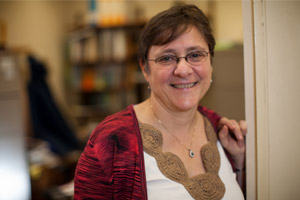Medical Education
Einstein Adds Curriculum on Adults with Intellectual and Developmental Disabilities
BRONX, NY—(February 28, 2019)—Children with intellectual and developmental disabilities (IDD) have long benefited from the training pediatricians receive to treat autism, epilepsy, cerebral palsy, or other disorders. Their doctors often connect these young patients with many professionals—from physical, occupational, and speech therapists to psychologists, social workers, and special-care dentists. But as children grow up, they soon discover there are far fewer physicians aware of their unique needs.

Joanne Siegel, L.C.S.W.Now, thanks to funding from the American Academy of Developmental Medicine and Dentistry (AADMD), Albert Einstein College of Medicine is developing a special curriculum for medical students geared to treating adults with IDD. The grant, part of the AADMD’s National Curriculum Initiative in Developmental Medicine (NCIDM), seeks to address educational gaps in medical schools in order to reduce health disparities for this population.
“Pediatricians have been trained to care for children with IDD since the 1980s, but all physicians need to understand how to treat these patients as adults and learn about health and medical issues that affect them throughout their lives,” said Joanne Siegel, L.C.S.W., principal associate in the department of pediatrics and co-director at the Rose F. Kennedy University Center for Excellence in Developmental Disabilities (RFK UCEDD). “By providing formal medical training to our students right before they start their rotations on the wards, we’ll better prepare them to meet the needs of patients, including adults with IDD.”
Einstein, one of only 11 medical schools in the nation awarded this curriculum grant, will incorporate lectures and presentations on communication and clinical skills this fall into two second-year medical school courses. The new material will cover common problems that adult patients with IDD face: Cultural biases, barriers to care, and increased risk for certain diseases or health problems.
“Pediatricians have been trained to care for children with IDD since the 1980s, but all physicians need to understand how to treat these patients as adults and learn about health and medical issues that affect them throughout their lives.”
– Joanne Siegel, L.C.S.W.
While the life expectancy of the general population has increased by about 30 percent over the past 80 years, the life expectancy of people with intellectual disabilities has increased by 200 percent, thanks to improved care and resources, said Ms. Siegel, who is leading the curriculum development. Once relegated to pediatric medicine discussions, IDD is actually now more prevalent in the adult patient population. “For the first time in recent history, there are more adults living with intellectual and developmental disabilities than children,” she added.
The Rose F. Kennedy Center at Einstein and Montefiore includes the RFK UCEDD as well as the Children’s Evaluation and Rehabilitation Center (CERC), operated by Montefiore Health System. Annually, CERC serves about 5,000 patients with IDD and provides medical, psychiatric, and dental services, along with social services and speech language, occupational, and physical therapies. Most of its patients are children, but the center also serves people older than age 18 with IDD who have transitioned from pediatric care. They receive services in its Harold Diner Special Needs Dentistry program, Adult Literacy program, and a new primary care program.
Some of the adults, known as self-advocates, meet weekly in groups to share challenges and successes related to independent living and decision-making skills in the community. The self-advocates also meet with legislators and community leaders to present ideas on health care, housing, transportation, and employment issues that affect their lives.
“In Einstein’s Introduction to Clinical Medicine course, we plan to add small group discussions with some of the self-advocates and their family members,” Ms. Siegel said. “Our clients also will share their experiences as patients and participate in the students’ observed clinical skills exams.”
NCIDM is a partnership between Special Olympics International and AADMD.
Other Top Stories
9/11 World Trade Center Exposure Linked to Heart Disease Among NYC Firefighters
On Becoming a Physician: New Einstein Students Receive White Coats and Stethoscopes
Novel Therapy for Acute Migraine Shows Promise in Phase 3 Clinical Trial
First Complete Wiring Diagram of an Animal's Nervous System
Multimillion Dollar NIH Grant to Help Reduce Opioid Use & Get Care to People Who Need It
NIH Grant Funds $23 Million Study of Diseases Affecting People Living with HIV
New TAILORx Data Guides Adjuvant Therapy in Younger Breast Cancer Patients
Einstein Celebrates Its 61st Commencement
Bolstering Biopsies: Testing Patients' Individual Cells to Guide Treatment



Tablet Blog